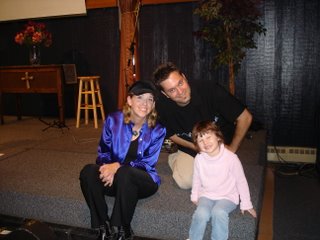Last week I had the privilege and pleasure of attending The Liberty Editors' Conference in Las Vegas, NV. It was a double boon, not only to spend some time with some of the preeminent libertarian minds in the country, but to spend some time in one of my favorite cities in a really delightful hotel and casino, The Mirage. It was an altogether good time, and a welcome break from the unremitting gloom I've found myself enveloped in lately due to the general state of the world. Las Vegas always seems so removed from the real world -- a glittering, neon-ladened, hedonistic tribute to excess and debauchery that normally would disgust my Austenian sensibilities, but that somehow, on that little strip of sin in the Nevada desert, works. It is easy to lose one's self there.
I highly recommend that anyone who is in love with the concept of liberty attend a Liberty Editors' Conference or, as is coming up next year, FreedomFest. It is refreshing and restorative to find a brotherhood of ideas and good will within the fiercely individualistic and diverse members of libertarian thought.
I could write a score of pages about the conference, but I want to write about the session that has haunted me the most. I attended a panel discussion on "Libertarianism and Religion." It seemed to me that the only topic worth discussing in this forum was answered within the first few minutes: Are libertarianism and religion compatible? Can one be both a libertarian philosophically and a devout practitioner of a certain theology without dire conflict? The answer is: Of course! So, where do we go from there?
I was hanging out with my friend, Joelle, a few months back, and I happened to mention that I had just discovered that a libertarian writer I had always loved, Stephen Cox, was also a Christian. I expressed my surprise at this to her because, I pointed out matter-of-factly, I had always assumed most libertarians were atheists. Joelle replied in her honey-tinged Southern drawl, "Well, I didn't know that. All the libertarians I've ever met were Christians." Reflecting on our shared circle of libertarians, I realized she was correct. The libertarians she and I run with are all Christians. Of course, this is a very narrow group -- all drawn together by the wonders of the Internet and blogosphere -- and I still believe that a parity, if not a majority, of libertarians is atheist.
Now, the panel at the conference was interestingly made up of two Christians, one agnostic, and one amusingly outspoken atheist. The audience, however, was mostly comprised of atheists -- or at least those were the ones who asked the most questions and made the most proclamations. My favorite moment of the session was when the first panelist, Jo Ann Skousen, introduced herself as a religious Christian (to the point of being *gasp* a Sunday school teacher) and gloomily predicted that she was the only religious libertarian on the panel. The next panelist, Stephen Cox, then introduced himself as a Christian, and Mrs. Skousen caught her breath in surprise. She exclaimed incredulously, "I had no clue! I've worked with him for three years on the magazine, and I had no idea!" It was funny and poignant and real -- we Christian libertarians have a long road to journey into the heart of a skeptical and humanistically rational political philosophy, but it is heartening always to find fellow travelers.
Now, the reason that this session sticks in my mind so decidedly is not because of what was said, but, rather, what was not. It is no surprise that religious people -- at least Judeo-Christian religious people -- can be libertarians without any compromise to their faith. In fact, as a devout Christian (to the point of also being *gasp* a Sunday school teacher), it is impossible for me to reconcile my understanding of who Jesus is and why He came and died and my freedom in Him without embracing libertarianism. As Libertarian Party members used to have to sign a "non-initiation of force" pledge upon joining, I have always held to that ideal in my political beliefs. I read in another's blog once that the church can and should do things that the government can not and ought not do. That makes a lot of sense to me. I will only refer to Christian libertarians for the rest of this post, since, as Ann Coulter once wrote, "I am a Christian, and I have a fairly good idea what they believe." Ann Coulter annoys both many libertarians and many Christians, so it is fun to quote her here.
After the session, my father and I were taking refreshment and discussing the, er, discussion. My dad said, "Did you notice how no one wanted to bring up the 800-pound gorilla in the room?" I was confused and asked, "What 800-pound gorilla?" My dad replied, "Well, no one brought up the main political breaking point between libertarians and Christians -- abortion." I was surprised my dad thought about this, since he has never been particularly concerned about abortion. But, my dad knows that I am, and what bothers me concerns him, I suppose. I had actually not thought about abortion during that session, and so I quickly began to think of what he had said.
The Libertarian Party platform contains an endorsement of unrestricted, privately-funded, legal abortion. In a party radically committed to "choice" of all kinds -- most of which I heartily agree with -- it is not surprising that people of that mindset would be seduced by the deceptive idea of a "woman's right to choose." On the other hand, there is a small, but growing, minority within our political philosophy that recognizes the faulty reasoning and inexcusable irrationality behind viewing abortion as a right rather than a violation of rights. The most prominent of these proponents of the pro-life point-of-view is Doris Gordon, the atheistic founder of Libertarians for Life. Her rationales against abortion are entirely scientific and philosophical. There is also James Matthew Wallace, aka the Compleat Heretic, whose conservative economics trend him libertarian, but whose abortion stance is strongly pro-life.
After reflecting upon those two good, pro-life atheists, and scummy pro-abortion "Christian" churches like the Methodists, I said, "Well, I do not think that abortion is the dividing line for libertarians and Christians. You can certainly be pro-life without being religious." And I mentioned Libertarians for Life. "Yes," my dad acknowledged, "But it is mostly Christians who hold to the whole reverence for life thing -- a gift from God -- human at creation, and so on." "I'm not too certain about that, " I replied. "It seems to me that atheists have a good reason to hold life sacred, since they believe that this life is all they have." "'Sacred' implies a religious outlook," my dad insisted. "No," I said, "I don't think so. I think most of the people at this conference would hold the concept of individuality 'sacred' without referring to God. 'Sacred' can simply mean something incorruptible and of the highest esteem." My dad ceded my point.
I think that the line that divides atheist libertarians from Christian libertarians is our epistemology. Most Christians believe that rational explorations are best examined in light of the perfect knowledge of God. Most atheistic libertarians would probably subscribe to Ayn Rand's belief in secular human reason. While this philosophical difference is a sticking point, I do not think that it is a breaking point. While atheistic and secular libertarians may subscribe to the ethics of enlightened self-interest, and Christians hopefully cling to the ethics of enlightened God-interest, neither of us wants to be ruled by rampant gov'ment-interest. And, surely, both of us can agree, in general, to the non-initiation of force. And I think -- I truly hope and believe -- that this belief in the non-initiation of force will soon lead even secular libertarians of all stripes away from one of the most egregious modern examples of unjustifiable initiation of force: abortion.
Abortion was only mentioned once at the conference that I heard, and then only by its socially acceptable euphemism of "choice." It was mentioned by Liberty's founder Bill Bradford's sister, Barbara, when asserting her concern with the "religious right's" influence on the Republican party. The two examples she brought up were their being anti-pornography in public libraries and their being anti-choice. I would think that, as a libertarian, she would be more concerned with the idea of public, tax-supported libraries than a group's wanting to keep pornography out of them (which would not be an issue in private libraries). To her worry about "choice," I could only hope to persuade her that, in a just and civilized society, no persons should be held as sub-human, no matter where on the life continuum they fall, and that no one should have the ability to murder another human, no matter how little they want that person around. Part of libertarian feminism ought to be a vociferous opposition to abortion, as abortion is essentially an admission of women's inability to shoulder responsibility for their actions. But, I do not think that this would be a breaking point between us. We would still most likely agree on 90% of the issues at hand, and those commonalities would be a gateway to persuasion.
I am a former radically "pro-choice" woman, and I do not doubt that all reasonable, ethical, clear-thinking people will eventually turn away from the great lie of abortion and toward respect for human life at every stage of its development. Libertarians, especially, will become the great standard-bearers of the pro-life movement, precisely because we do not believe in the initiation of force, whether by governments or individuals, and we do believe in the extreme importance of the individual -- a sacredness that cannot be corrupted by another's desire to see that individual annihilated. That is one of my great hopes for the movement.
Maybe Dad's 800-pound gorilla was there, but maybe it was more of a 130-pound chimpanzee. To turn a phrase of Thomas Jefferson's upon its head, "I tremble with anticipation for my political philosophy when I reflect that libertarians long to be just -- that their sense of justice cannot sleep forever." Libertarians are a relentlessly decent lot, and this decency will turn them increasingly toward the pro-life point-of-view. The view that one person can ever be another's property to be disposed of as the "owner" sees fit is so unsupportable within libertarian principles that it will give way inexorably to the shining ideals of life, liberty, and the pursuit of happiness.
"He felt that he was in possession of some impossible good news, which made every other thing a triviality, but an adorable triviality." -- G.K. Chesterton, The Man Who Was Thursday, Chapter XV
Thursday, October 26, 2006
I Hate Halloween!
And not for the reasons that most Christians do. In fact, I hate it not for any religious reason at all.
My daughter is fearless and curious. This year, with the proliferation of Halloween decorations everywhere we go, Sadie has been exposed to some very frightful images. Since she is curious, she examines and is fascinated by every single one. And, in the daytime, she is fearless. BUT, for the past month, she's been waking up every night, sometimes in tears, because of nightmares. I am convinced that this is due, in large part, to the Halloween decorations. There are gruesome, blood-covered, disembodied heads and arms meeting us at every retail turn. There are jack-o'-lanterns with vicious, vacuous smiles and adult-sized mummies with creepy eyes peering between the wrappings that lunge toward the unsuspecting when triggered by motion sensors. There are vampires and witches and I even saw some sort of flying skeleton ghoul at Albertson's last night.
Note to retailers: This stuff really isn't "fun," people!
It seems like this is a lot worse than when I was a kid. I was a cowardly child who had nightmares about the Haunted Mansion at Disneyland, but the decorations in everyday settings around Halloween nowadays seem to go beyond the silly Disney frights and into the realm of real terror. I could understand these realistic depictions of our subconscious bugaboos in adult settings, but these truly horrifying "decorations" have found their way into kid-friendly places like The Little Gym, Sam's Club, and, as before stated, the grocery store.
I can hardly wait until November 1 and another ten-month respite from the ubiquity of annoying and frightening Halloweenisms. Bring on the Christmas decorations!
My daughter is fearless and curious. This year, with the proliferation of Halloween decorations everywhere we go, Sadie has been exposed to some very frightful images. Since she is curious, she examines and is fascinated by every single one. And, in the daytime, she is fearless. BUT, for the past month, she's been waking up every night, sometimes in tears, because of nightmares. I am convinced that this is due, in large part, to the Halloween decorations. There are gruesome, blood-covered, disembodied heads and arms meeting us at every retail turn. There are jack-o'-lanterns with vicious, vacuous smiles and adult-sized mummies with creepy eyes peering between the wrappings that lunge toward the unsuspecting when triggered by motion sensors. There are vampires and witches and I even saw some sort of flying skeleton ghoul at Albertson's last night.
Note to retailers: This stuff really isn't "fun," people!
It seems like this is a lot worse than when I was a kid. I was a cowardly child who had nightmares about the Haunted Mansion at Disneyland, but the decorations in everyday settings around Halloween nowadays seem to go beyond the silly Disney frights and into the realm of real terror. I could understand these realistic depictions of our subconscious bugaboos in adult settings, but these truly horrifying "decorations" have found their way into kid-friendly places like The Little Gym, Sam's Club, and, as before stated, the grocery store.
I can hardly wait until November 1 and another ten-month respite from the ubiquity of annoying and frightening Halloweenisms. Bring on the Christmas decorations!
Friday, October 13, 2006
Happy Birthday, Flicka!


I have good reason to believe that Flicka Spumoni's birthday is occuring today. A happy, blessed birthday to her! As fine a writer as she is, of course, ageless -- existing on a separate parallel outside of time where every mark with keyboard or pen leaves an indelible stamp on eternity.
I do not know much about Flicka, but everything I do know makes me wish to know more.
She is as gifted a writer as you could hope to find and I trust that we'll all soon be saying to our local newspapers, "Why, (Flicka Spumoni)? Of course! Well, you see, I've known her since the blogging days . . ." as we bask a bit in her reflected authorial glory.
Check out the "placeholder" page that I made for her at 43 People. It's nice to have someone on my list there who is still alive and kickin'. (I tend to like far too many people from the past, but, really, looking at so many of the people of today, can you blame me? All dear readers of Musings are excluded from that general censure.)
Happy B-Day, Lower Great Lakes Lady!
Sunday, October 08, 2006
My New Wallpaper
Jason put up a new wallpaper on our computer's desktop -- a fact that interests no one but me; however, this picture is too cool to remain veiled from the world at large so I am posting it here for the general edification of the masses (my five remaining stalwart blog readers -- I love you guys!).
Behold! Here are two of the world's finest music makers, and one very accomplished general noise maker at a CPC fundraising dinner on September 23, 2006 in Coquitlam, BC. Ladies and gentlemen, I present Carolyn Arends, Spencer Capier, and that Meck Creature of a Child herself, Sadie Bug:

Behold! Here are two of the world's finest music makers, and one very accomplished general noise maker at a CPC fundraising dinner on September 23, 2006 in Coquitlam, BC. Ladies and gentlemen, I present Carolyn Arends, Spencer Capier, and that Meck Creature of a Child herself, Sadie Bug:

Subscribe to:
Comments (Atom)